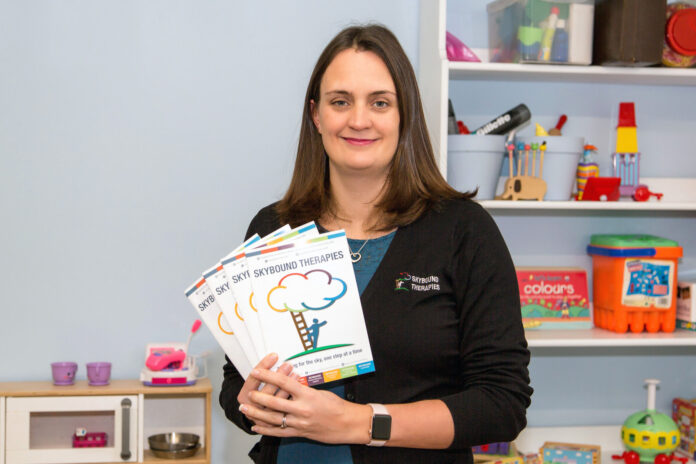Skybound Therapies, a world-renowned behaviour analysis and therapy centre at Wiston near Haverfordwest, is collaborating with the University of South Wales on the programme to study the combination of behaviour science with a specific set of speech and language techniques.
Skybound Therapies provides tailored support to help improve the quality of life for individuals with learning, behavioural or emotional difficulties. It was founded in 2012 by Risca Solomon, who first discovered behaviour analysis when looking for ways to support her foster brother Dan.
Her journey to help raise Dan, which she documented on YouTube, led her to discover TalkTools, which uses specially designed exercise tools to teach non-verbal children how to speak.
“As soon as we found out about it, I felt that was what Dan needed because he has verbal dyspraxia as well as autism,” says Risca. “Verbal dyspraxia means you can’t kind of coordinate your motor unit and muscles to do what you want when it comes to speaking with the mouth.”
This meant Dan could only make three sounds but couldn’t shape his mouth to make others.
“Using TalkTools, we were able to teach him to shape his mouth into a range of different sounds,” says Risca. “He can now say 120 words. He’s never going to be conversational, but he can use words to request all of his basic needs.”
Risca decided to complement her behaviour analysis training with training in TalkTools. Since then she has worked with her team at Skybound Therapies to help many children achieve success similar to Dan’s.
“We’ve taken children who have been completely nonverbal, even at an older age than Dan, and they have developed the ability to speak,” she says.
The benefits don’t stop at being able to say words.
“We recently had a child who had never blown his candles out,” says Risca. “He’d never blown bubbles. Now, he’s blowing bubbles, he’s blowing horns, and he can blow his candles out.”
Risca now lectures internationally on teaching children with ASD using behaviour analysis and TalkTools, and Skybound Therapies is currently collaborating with the University of South Wales on a European grant funded programme to study these techniques and the outcomes they have on speech.
“Dan was 12 when we started using the speech techniques, whereas we had been told by a speech therapists that if a child doesn’t talk by six, they’re not going to learn to speak,” says Risca. “But we’ve seen so many children who, with this combination of behaviour analysis and these tools, have developed speech even when everybody said wouldn’t be able to.”
In the light of this, the University of South Wales has teamed up with Skybound Therapies to research her combined behaviour analysis and TalkTools approach further. A grant-funded PhD student is working an Applied Behaviour Analysis school in London to carry out the research.
“We’re very excited about this project, which provides us with the right structure and environment to properly research the efficacy of these techniques,” says Risca. “We hope the results will benefit many more children like Dan.”
A USW spokesperson said:
“The University initiated the project with the aim of increasing the evidence base for interventions that are targeted at improving speech skills for young learners with minimal verbal communication. There is relatively little research in this domain which makes it challenging to provide sound clinical recommendations.
“Firstly, we are keen to identify gaps in existing research in this area. This is an essential initial step for determining areas for improvement and will hopefully guide future research and help to strengthen the evidence base.
“Secondly, we aim to provide some preliminary data on the feasibility and effectiveness of an intervention which is currently used in clinical practice. The intervention, which involves a variety of oral motor prompts and exercises, targets sound production by focusing on the strength, coordination, and control of the muscles involved in speech. As part of our work, we are developing resources that we hope will help clinical practice, as well as facilitate future large-scale research efforts.”

| [donate]
| Help keep news FREE for our readersSupporting your local community newspaper/online news outlet is crucial now more than ever. If you believe in independent journalism,then consider making a valuable contribution by making a one-time or monthly donation. We operate in rural areas where providing unbiased news can be challenging. |


















